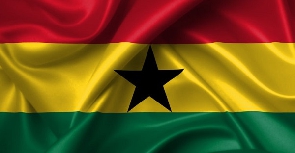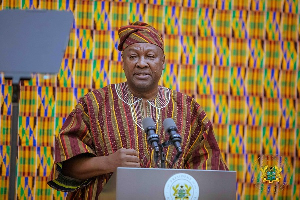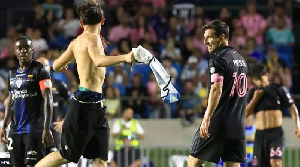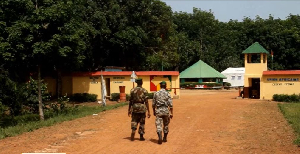Studies on leadership across different spheres of life, from petty business to large corporations, chieftaincy to family, have shown that vision is key to setting, implementing, and progressing toward one's goals. However, unlike other qualities such as decisiveness, initiative, people management, proactiveness, etc. that can be taught at any university, vision is not the same; it is innate—you either have it or not.
So, what do we mean when we say someone is visionary? A visionary leader is an individual with a clear idea of how they envision the future and set concrete steps to plan, execute, and lead a team toward accomplishing it. So, at this moment, when Ghana is at a crossroads and needs a visionary leader to dig us out of our terrible situation, we are left with largely two choices: former President John Dramani Mahama and Vice President Dr. Mahamudu Bawumia, to pick from.
Thankfully, we are blessed with a number of experiences under both candidates, either as head of our Economic Management Team (EMT) at one time or as vice
presidents to guide us in making our decisions. So, join me as I dissect 10 issues that prove that choosing John Mahama as our next President is a safer bet than Dr. Bawumia when it comes to visionary leadership.
The Covid Experience:
To begin, it is imperative to consider the way and manner in which the impact of COVID-19 was subdued in Ghana. Despite the fact that, due to poor leadership, more people died per population size compared to most African countries, without John Mahama’s infrastructure to cushion us, our situation would have been worse. Ahead of COVID, John Mahama anticipated that any sudden epidemic or pandemic in the country would spell disaster for us and concluded that a well-prepared health infrastructure would be needed to deal with such unexpected occurrences. So, he took the initiative to build or expand a number of hospitals and other health facilities across the country.
These include the Ridge Hospital, the University of Ghana Medical Centre (UGMC), Ga East Municipal Hospital, Sewua Hospital, Bolgatanga Hospital, the 2nd phase of the Tamale Teaching Hospital, Aferi Military Hospital, the Maritime Hospital, Tema, the Dodowa, Tepa, Salaga, Kumawu, Abetifi, Fomena, and Bekwai District Hospitals, just to mention a few.
Apart from that, he introduced the ‘Onuado’ medical vans to attend to the health needs of remote communities. He also built isolation centres to handle any such outbreaks and retooled hospitals with new machines for them to be able to withstand any unexpected pressure on the health sector. Fortunately for Nana Addo and Dr. Bawumia, these came in handy in helping them deal with Covid 19. It made readily available infrastructure, logistics, and technical support for them, leaving only the procurement of vaccines, case management, and disease control for them to handle, but still, they looked on for so many to die. Interestingly, the experiences of COVID awoke President Nana Addo and Dr. Bawumia to the realization that they needed to build 111 hospitals across the country, a.k.a. Agenda 111. Subsequently, it has become a 2020 campaign promise that has since been a mirage 4 years onward.
The Education Sector:
The second proof is in the realm of the education sector, where former President John Mahama started the progressive free SHS, built over 120 E-blocks (Day Senior High Schools), and gave out free laptops to students. Despite a detailed explanation from John Mahama that the policy is only feasible when implemented progressively, the NPP refused to accept or understand the perspective and insisted that they would do a more instantaneous and direct-free SHS. When the opportunity came, they implemented it without any recourse to the warnings John Mahama gave.
In its early days, even with the help of John Mahama’s E-blocks, they couldn’t accommodate all the students and had to opt for a double-track system, which later became a triple-track in some of the schools. This has diluted the quality and hyped the cost of an education that was intended to be free. Schools are struggling with food shortages, there are no textbooks, teachers are struggling to complete even half of the curriculum, students are staying in school for a month and out of school for two or more months per term, some schools are not writing exams because there is no money, and Parent-Teacher Associations (PTA) are being remade to take out teachers and keep everybody quiet so that issues can be swept under the carpet. Anyone who dared to expose the rot is suspended, transferred, or dismissed.
Recently, 11 headteachers were interdicted/sacked for collecting unauthorized fees. Several institutions and individuals bemoaned the decision for its lack of depth and understanding of the circumstances, but the government ignored it. The President of the National Association of Graduate Teachers (NAGRAT) summed it all up when he indicated that the government is using the free SHS to destroy the education system and advised headteachers to leave the schools in the state they are in and not try any effort to solve problems because, in doing so, they could end up in trouble. He added that if something is bad and one is being stifled from saying it, sooner or later, the cat will be out of the bag.
It was in anticipation of all these challenges that we were urged to be progressive in the implementation of free SHS, but it fell on deaf ears. Key stakeholders, including the teacher and headteacher bodies, have called for a review of the policy, but the embarrassment of doing so and consequently vindicating John Mahama has ensured that we continue to destroy the education sector. Even the closest family member of the President, Finance Minister-turned-international financial envoy Ken Ofori Atta, alluded to the fact that the success of the SHS hinges on progressive implementation.
This clearly proves that John Mahama is far more visionary than President Nana Addo and Dr. Bawumia combined. Additionally, this same lack of vision of President Nana Addo and Dr. Mahamudu Bawumia permeated their continuous lambasting of the location of the E-Blocks built by John Mahama as too remote and unintelligent. Unfortunately for them, it has been established that locating schools, hospitals, or airports away from the main community is rather a masterstroke that has served some communities very well. The vision is to expand communities to become more economically active and urban in nature. A few communities I visited recently show that the location of the e-blocks has already caused traction toward the schools, with more shops and residencies springing up around these facilities. Let me not complete without acknowledging that John Mahama distributed free laptops even before Bawumia and his boss dreamed of it. Only visionaries can foresee these things.
Banking Sector Clean Up:
One of the saddest occurrences in the tenure of President Akufo-Addo and Dr. Bawumia was the collapse of banks, microfinance, and savings and loan institutions. A decision that rendered thousands of people jobless and has since destabilized the foundations of our economy. Even worse is the knowledge that a clean-up that could have been fixed with GHC 9 billion ended up costing us GHC 21 billion and more in terms of direct costs.
This has shifted financial power to foreign banks at our expense. However, all Dr. Bawumia and his team needed to do was see into the vision of John Mahama, who, instead of collapsing the banks, provided liquidity support to some of these ailing banks to try and gradually aid them back to health. Especially as he hoped to position the financial sector on the shoulders of Ghanaians and not foreign banks. Drawing inferences from the past, we can wholeheartedly say that, had John Dramani Mahama won the 2016 elections, more progress would have been seen in the banking sector than today, as the pharmaceutical sector bears witness. However, he was not able to win, and today, President Nana Addo Dankwa Akufo-Addo and his economic whiz kids are on their knees, begging the IMF for debt restructuring. Today, the carelessness of their actions has ensured that the decisions of President Nana Addo and Dr. Mahamudu Bawumia have come back to bite them, with the economy now in shambles. It is also proof that John Mahama is a far more visionary leader than they are.
Nurses' and Teachers’ Allowances:
Somewhere during the leadership of President John Mahama, he came to the research-supported conclusion that the paying of the teachers' and nurses' allowance was a drain on the public purse, especially as there are so many more nurses and teachers being churned out each year compared to the space available to absorb them. He proposed that a replacement of this policy with a student loan was a more prudent choice and would be helpful to the economy. Dr. Mahamudu Bawumia disagreed with him and travelled the length and breadth of Ghana, lambasting him and promising to restore the allowances if they were voted into power. As promised, they did; however, the aftermath is there for all to see: who the visionary leader is. The struggles of paying the allowances have since led the government to hype fees of trainee teachers and nurses, introduce a national service scheme for teachers after completion, and other strategies to reduce the pressure on the finances of the country, yet the government is still in arrears of allowances for several months. Why? because they didn’t listen to the vision of John Mahama towards building a better system.
Atuabo Gas and Teshie Desalination Plant:
Two projects come to mind when talking about visionary leaders in Ghana after Osagyefo Dr. Kwame Nkrumah, i.e. the Atuabo Gas Project and the Teshie
Desalination plant. Their financial and problem-solving value to the nation make them outstanding. The Atuabo Gas Plant was a $1 billion project built by the Atta Mills/John Mahama administration to address the challenges of the energy sector in the country. Since its commissioning, it’s been established that its economic value to the state overrides the combined value of all the 1D1Fs. It is presently our main gas source for generating electricity and part of its products are also exported to neighbouring countries. The desalination plant at Teshie was also established by the John Mahama government to address the water shortage problems in the Teshie and Nungua areas using seawater. It is the first production of drinking water in Ghana from seawater.
Since Dr. Bawumia and his boss took power in 2017, the plant has been shut down multiple times and is presently non-functional. At the same time, Teshie and its environs have been plunged into regular water shortages. The lack of vision is so evident that we will be blind to handing power over again to such inept leaders.
Roads, Overpasses, and Bridges:
As President, John Mahama told Ghanaians that, to open the economy up, we need to build more infrastructure, including roads, bridges, overpasses, etc. The economic whiz kid, Dr. Mahamudu Bawumia, asked if we eat roads. John Mahama’s response was that we don’t eat roads but roads determine what we eat. So, while he built roads, overpasses, bridges, etc. they mocked him and questioned his competency. Years later, they are in power and have commissioned three years of roads without building any significant roads. The situation got so bad that citizens became agitated with some mocking government entourages wherever they faced the unfortunate fate of their vehicles breaking down or getting stuck in muddy roads due to disrepair. Others sacked their MPs and swept their footprints in protest of the deplorable state of the roads. When things got really bad, people hooted or threw sachets of water at them (a case in mind is that of the honorable Osei Kyei Mensah Bonsu). They are in their last year of office, have suddenly discovered the importance of roads, and are anxiously trying to build a few to win the people’s hearts before the elections. Clearly, that is strong evidence of a lack of vision and why John Mahama is a better leader.
Recruitments into Security Services:
A lot of Ghanaians may have noticed that from 2017 until today, advertisements for the recruitment of people into the security services have become scarce. People are now recruited by the so-called ‘old applications’, the party channels and the family and friends approach. Qualifications are the least important now, and party goals are the focal issue. All you need to get into the security services is to flash an NPP card. It got so bad that vagabonds, vigilantes, hooligans, and phone fraudsters who could not speak simple English but went through 6 weeks of training became members of our security system. The minority in Parliament, police officers like Kofi Boakye and Agorzor, all expressed their concerns about the desecration of the honourable security services.
Regrettably, the NPP’s thinking is that by doing so, the party leadership will gain popularity among their members; additionally, the party-filled security apparatus could be malleable enough to use in intimidating opponents and implementing election rigging operations; Techiman and Ayawaso West Wuogon are recent election memories to buttress this point.
What they have failed to avert their minds to is that these misfits brought into the security system and armed with weapons could be of any breed and character. They could thus become an albatross on the neck of the entire country in the long run. Without much stress, observations reveal a sudden rise in the number of members of the security setup partaking in armed robbery and kidnapping operations. The kidnapping of the Canadian girls, the gold robbery at Akwatia, the Kokrobite robbery, the Garu robbery, the Asankragwa robbery, etc are evidence of this canker. Others are now key participants in land-guard operations, a sad spectacle indeed.
Now let us imagine what could happen if these hooligans team up and decide to torment a community, take over mineral resources, or oust our president. So, we are treading dangerously and the perpetrators must see the short-sightedness and selfishness in their plan. On the contrary, John Mahama showed visionary leadership by ensuring that the recruitment of people into the security services was more transparent and more nation-serving than people-serving. That is what we mean by a visionary leader.
Energy Sector:
Debatable as it is, dumsor is what ended John Mahama’s chances in 2016. The propaganda at the time and people’s refusal to acknowledge that the energy challenges were a cumulation of years of inaction on the part of previous governments in increasing our energy capacity to match population increase. So, he brought in Ameri, Karpower, TIC, etc. to address this problem. The arrangement was to own these power barges, etc., at the end of the agreement. Additionally, it was also to buy the country time to put in place alternative power structures such as solar and atomic/nuclear energy. To ensure that legacy debts are paid and sustainability is embedded in the management of our energy sector, he also established an Energy Sector Levy Account (ESLA) to offset legacy debts accumulated even before President J. A. Kuffour’s time. President Akufo-Addo and Dr. Bawumia once again berated then-President John Mahama for creating songs and punchlines to gain votes. Today, after John Mahama had left all these structures for them and made the energy sector less challenging to manage, they have rather ended Ghana in an even worse situation. A mark of visionless leadership and proof that John Mahama thinks deeper and wider than Dr. Bawumia and co.
We Won't Go To IMF:
Economists agree that challenges in the sector are not novel for governments, especially in Ghana. John Mahama, at the peak of his economic difficulties, went to the IMF for policy support. Before that, they analyzed the state of the economy, establishing the pros and cons, before heading to the IMF. Ensuring that they did so early enough to prevent dire consequences for the people. The Nana Addo/Bawumia government, after experiencing a similar fate, hid behind jargon and taxed to survive the challenge. With experience and foresight, John Mahama advised the whiz kid and his brother, who had yet to even notice the dire nature of their situation, to go to the IMF. He was of the opinion that this would reduce the burden on the people compared to what the citizens would face should there be further delays.
Unfortunately, because of their shortsightedness, President Nana Addo and Dr. Bawumia went on a rampage, proclaiming that Ghana was a proud sovereign state and that we would not go to the IMF. Eventually, they did what John Mahama asked them to do long ago, but they refused to. Unfortunately, by then, Ghana’s economy had been crippled, was on a stretcher, and needed a debt exchange programme (DEP) badly. Clearly, the lack of vision to see the future that John Mahama is able to see is legendary.
Digitalization Noise:
The final and most concrete evidence of John Mahama’s visionary acumen over that of Dr. Bawumia and his boss is the digitization and digitalization noise. Today, Dr. Bawumia has run away from the economy that he professed to be the number one expert in and is going around claiming he is the digitalization man. Let’s peruse the evidence to see who really is the visionary. The pillars of Ghana’s digitalization started with the laying of fibre-optic cables from Accra to Wa. Who did that? John Mahama.
The Ghana Digital Centre was built to serve as the central database to
support the storage of national data and beyond. Who built it? John Mahama.
The dotgov platform, which runs all government e-platforms, was established by who? John Mahama. Who digitalized the passport process in Ghana? John Mahama. The interoperability platform for money transfers commenced in 2016. By who? John Mahama. The e-transport was started using the Ayalolo metro mass transport. By who? John Mahama. This and many more were started or benchmarked to commence by the John Mahama government.
What seems to be happening is that Dr. Bawumia, upon chancing on the digitalization strategy of the Mahama administration to transform the country, realized the depth of his vision and decided to run away from his reeling economic ship and board the digitalization train. And his approach is to tweak bits and pieces of John Mahama’s plans, rename them, and sell them as his.
Unfortunately, the vision behind the document is not his, and his decision not to acknowledge the role of the vision-bearer has made it appear even more dishonest before citizens. A cursory look at Dr. Bawumia’s purchase of waakye with an e-pay card and the manner in which it died a silent death show easily that they are not in John Mahama’s league.
Beyond all these, a lot of citizens are unaware that the ‘Planting for Food and Jobs’ program by the NPP was a John Mahama project with Canadian support to fund the agriculture sector. The NPP came, was renamed, and was messed up. The NPP’s ‘1 District 1 Factory’ was also established on the pillars of John Mahama’s Exim Bank set-up to fund industrialization. Many other similar cases exist that show how embarrassingly the Bawumia team has adopted and rebranded John Mahama’s ideas.
It is therefore important that we take the issue of selecting a leader for Ghana very seriously and accord the nation the level of thorough thinking it deserves. If we want to move forward, we need to stay alert to populist and self-centred politicians and policies that lack the vision and futuristic considerations to help us catch up with global leaders. It is for this reason that John Mahama stands tall when it comes to who is visionary compared to the present leadership.
Opinions of Monday, 25 March 2024
Columnist: Opanin Mensah Ntow















